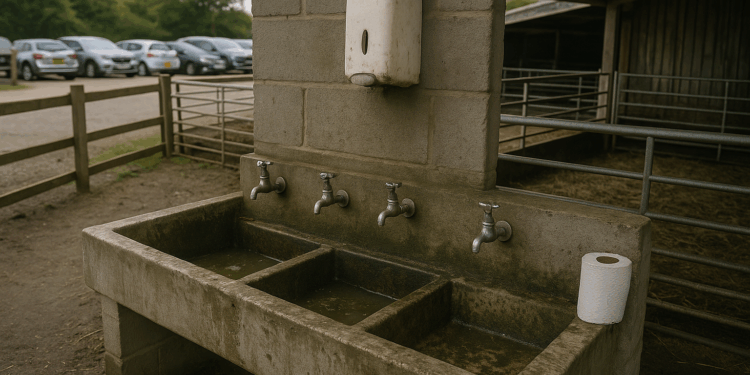Story Highlights
– Over 200 people infected with Cryptosporidium on Isle of Wight.
– Farm owner fined £8,000 for health safety breaches.
– Poor hygiene practices led to widespread illness among visitors.
– Many victims report lasting health issues post-infection.
– HSE emphasizes importance of risk management at farms.
Full Story
A recent outbreak of illness linked to a petting farm on the Isle of Wight has resulted in significant health repercussions for visitors, with 264 individuals diagnosed with Cryptosporidium, a zoonotic infection often responsible for severe gastrointestinal distress. Consequently, the farm’s owner, Sharon Wheeler, aged 60, has received a fine of £8,000 following a court ruling that highlighted serious breaches in health and safety regulations during the farm’s animal feeding activities.
The disturbances arose during a period from April to May 2023, when the farm hosted an animal bottle feeding event that allowed visitors, particularly children, to feed lambs and goat kids. According to health authorities, this event was attended by approximately 2,400 visitors, over 30% of whom subsequently became infected with cryptosporidiosis, an illness characterised by symptoms such as extreme diarrhoea, abdominal cramps, and vomiting.
Reports indicate that many attendees experienced what’s been described as the worst diarrhoea and vomiting of their lives. This outbreak not only led to physical discomfort but also created lasting impacts on families, with multiple victims reporting long-term gastrointestinal issues. For some, the experience necessitated hospital admission and significant time away from work and school, resulting in a staggering total of 1,254 lost days attributed to this illness. The psychological impact was also apparent, as some victims expressed fears about their children’s health and apprehensions about future interactions with farm animals.
The Health and Safety Executive (HSE), alongside the UK Health Security Agency (UKHSA), initiated a thorough investigation into the outbreak. The findings raised serious concerns regarding the management of the feeding activities at Hazelgrove Farm, pinpointing several areas of negligence. Investigators uncovered failures to adequately assess health risks to both staff and visitors, as well as substandard washing and drying facilities. Particularly alarming was the observation of visitors, including children, engaging in direct contact with polluted animals, despite evidence of unhygienic conditions.
Following the judge’s assessment of the evidence, District Judge Galloway stressed the gravity of the situation, stating, “There is no doubt that the events to which they refer are and were serious.” He acknowledged the profound psychological effects experienced by victims, with many suffering from symptoms akin to post-traumatic stress disorder due to the traumatic nature of the outbreak and the resulting health crises.
During the court proceedings at Southampton Magistrate’s Court on 11 November 2025, Wheeler entered a guilty plea to the charges under the Health and Safety at Work etc. Act 1974, which emphasises the responsibility of employers to safeguard the health and safety of those affected by their operations. In addition to the monetary penalty, she was ordered to cover costs amounting to £9,528.35.
Post-hearing, HSE inspector Francesca Arnold communicated the critical importance of risk management on farms, particularly those inviting public interaction. She remarked, “Health risks from contact with the animals need attention and must be controlled,” underscoring that if proper precautions had been enacted, the outbreak could have been prevented. Arnold emphasised the necessity of implementing effective control measures to safeguard both visitors and staff, allowing for safe and enjoyable farm experiences.
Zoonotic diseases, defined as those transmitted from animals to humans, are a significant concern for the agricultural sector. Though the likelihood of contracting such illnesses can often be low, the risk escalates under conditions devoid of adequate health and safety measures. Cryptosporidium, specifically, can survive long in the environment and is known to require minimal exposure for infection to occur. This underlines the importance of stringent hygiene practices to mitigate risks associated with animal contact.
In response to these incidents, industry advisories aimed at helping farms manage zoonotic risks are readily accessible via platforms such as the Access to Farms website. The HSE has collaborated in the development of guidance designed to aid agricultural operators in complying with health and safety legislation, which includes practical recommendations to minimise exposure to harmful microorganisms.
The prosecution was spearheaded by HSE enforcement attorneys Robert James and Kate Harney, with paralegal officer Stephen Grabe also involved in the case. The HSE remains committed to safeguarding public health and ensuring that proper standards are upheld across the agricultural industry to prevent similar incidents.
Further information on legislation governing health and safety in the context of agriculture can be found through HSE resources, including guidelines on the prevention and control of health issues arising from animal interactions at visitor attractions.
As the case underscores, while farms can provide enriching recreational and educational experiences, it is paramount that operators take rigorous precautions to ensure public safety. The need for enhanced awareness among farmers regarding zoonotic risks is critical to fostering a safer environment for both visitors and animals alike.






















This outbreak highlights the critical need for stringent on site hygiene and risk management at visitor attractions with animal contact. Hand washing facilities and clear supervision during feeding events are not optional they are essential to prevent transmission of pathogens like Cryptosporidium. Operators must assess and control risks, provide staff training, enforce hygiene practices, and communicate hazards to visitors. Regulators and owners should use the lessons from this incident to review protocols, improve facilities and monitoring, and ensure prompt reporting and support for affected people to reduce future harm.
This outbreak is a clear example of the serious consequences when basic hygiene and biosecurity measures are not properly managed at visitor attractions. Farms that allow close contact with animals must have robust risk assessments, clear written procedures for handwashing and supervised animal handling, adequate facilities for hygiene, and staff trained to enforce controls. Regular review of practices and prompt reporting of illness linked to the site are essential to protect public health and reduce both physical and psychological harm to visitors. Enforcement action and fines are appropriate when failures lead to widespread illness, and operators should use this case to implement lasting improvements and rebuild community trust.
This outbreak highlights why basic hygiene controls and clear supervision at animal attractions are not optional. Farms open to the public must enforce handwashing, provide appropriate handwashing facilities and signage, and ensure staff are trained to manage risks during events. Proper risk assessments and prompt reporting of suspected infections are essential to protect visitors and reduce long term harm. Accountability for failures protects public health and reinforces the need for consistent standards across similar venues.
This outbreak is a stark reminder that basic hygiene and proper risk assessment are essential on sites where the public, especially children, come into contact with animals. Farms open to visitors must have clear procedures for handwashing and supervising interactions, effective signage, and staff training to prevent contamination. Regular reviews of practices and prompt response to any lapses are needed to protect health and limit long term impacts on visitors. Authorities and operators should work together to ensure lessons are learned and similar incidents are avoided.